New Zealand is one of the most popular countries for backpackers all over the world. If you are playing with the idea of doing backpacking yourself but you are not sure if New Zealand is the right choice, let me tell you what this country has to offer and what you can expect from New Zealand.
Table of Contents
What can I expect of Backpacking New Zealand?
Many travel enthusiasts face their first and most important question before they even leave their home: Where should I go? It doesn’t help that the world is stuffed with beautiful places. Especially for Europeans New Zealand became a favorite destiny. One of the reasons might be, that traveling and living on the other end of the world, and by that getting as far away from your responsibilities at home, is an intriguing prospect. But reducing the country of the Kiwis to this simple fact would be like saying “I like Pizza because it is the biggest opposite of Brussel sprouts I can imagine”. New Zealand has one of the most diverse landscapes on earth. Beautiful beaches with seal colonies and snowy mountains with breathtaking views are separated by a 3-hour drive only.
If you are into hiking you probably are going to think of New Zealand as your personal Garden of Eden. If you like the idea of going on a hike, but not without the hot shower in the evening and a proper bed for the night, there are numerous of one-day hikes with astonishing panorama. When you’re looking for a more adventurous trip with all the features of being a part of Mother Nature, the smell of 5 days hiking and sleeping in a tent included, then the incredible great walks are right in your league. The sheer number of backpackers created a welcoming atmosphere among the locals and a hospitality sector that concentrates mainly on what backpackers need and like. A lot of backpackers ended up staying longer in one place than expected, simply because they found a comfortable place that is easy to call home.
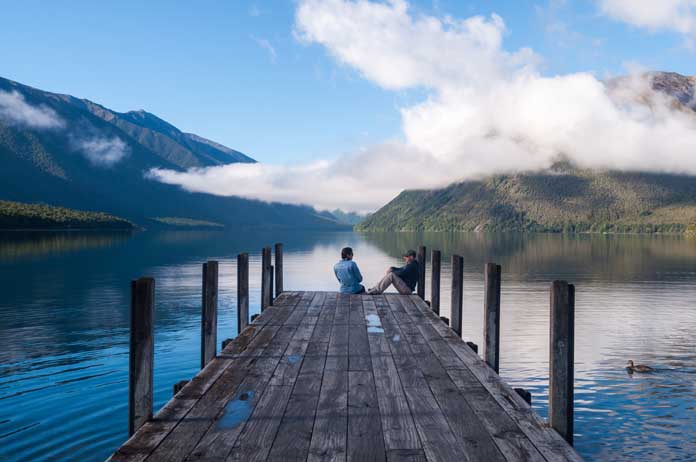
When should I go to New Zealand?
There is the main season for traveling in New Zealand, which is starting in October and lasts until March. The reason for that is simply because these are the warmest month. Many travelers use the opportunity to escape the winter in the northern hemisphere by simply jumping forward from northern autumn to southern spring. I can relate to that idea entirely for people that come to New Zealand for a couple of months only because then you can enjoy the New Zealand summer with the beaches, hikes, and attractions with the warm but moderate temperature of this country.
The downside to that, you won’t be the only one here. In fact, a lot of places are booked out a couple of months ahead. The main sights are sometimes crowded, and you will find it troubling to find a place where no other backpacker isn’t already waiting for you. That doesn’t have to be a bad thing, but it apparently requires more planning, and you sometimes will feel like a small part of a big group rather than being a single traveler exploring the world.
If you are going to stay in New Zealand for up to a year, I would advise coming here during the winter season to avoid the big crowds. There are many landscapes which develop their unique atmosphere especially during winter, and the ski resorts are the perfect spot for the fan of skiing and snowboarding. By the time the summer comes you will be way ahead of all the other arriving travelers while still having enough opportunities to get in touch with fellow travelers and locals alike.
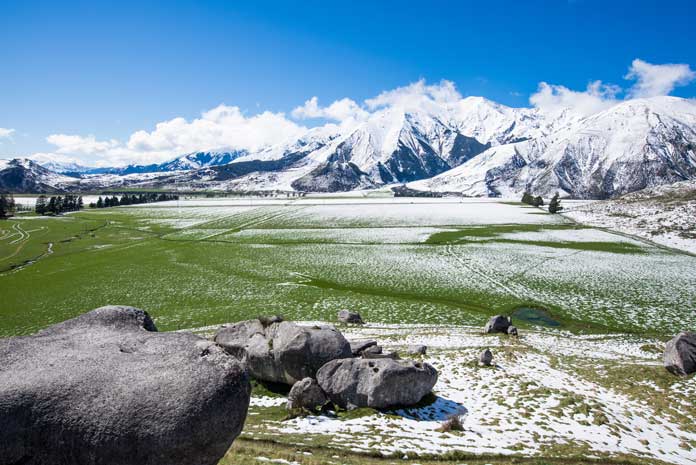
What do I need to do before I come to New Zealand?
Well, this won’t be a list of all the stuff you could do, because I feel like many websites seem to think a backpacking trip is a practical task. Don’t get me wrong; you have to do your homework, but it is not nearly as complicated as it appears in some guides. So let’s have a look at the list:
- Get your visa: for that, you simply need to apply for a visa online and follow the guide for applying for a visa. Just check out the official website.
- Meet the requirements of the visa: That only means you need to have a valid passport and for certain visas some other conditions, e.g. for the working holiday visa you need the required saving on your bank account.
- I know it feels like there should be more to it, but there is nothing else you need
Obviously, you have to think about more facts like “What should I bring with me?” or “Are there things I have to take care of back home before I leave my country for a long time?”. There are many guides for that, and we might provide one for you as well, but please consider one thing: Your travel should be an individual and unique experience and preparing for it is when it starts.
My anticipation before I started my first long-term travel was an exciting time, and I hate the idea of missing out on that by using agencies or just taking the same steps as a guide tells me to. So take the time to sit down and think about what YOU need to prepare and to what extent you would like to know how your trip is going to be like. Think about it like this: What adventure ever started with the sentences “Let me just make a quick pro and con list and look at that documentary on how it is done correctly.”?
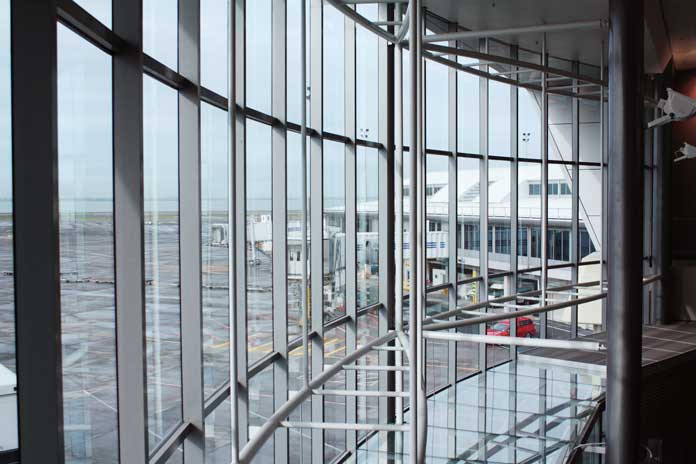
How should I travel?
Backpacking New Zealand means carrying all your belongings with you, OK. But what is carrying the backpacker? There are many options, from a rental car to your van to bus service and hitchhiking. First of all, buying a vehicle is not necessary. Do not let you talk into that by arguments like “You cannot go to all places; you will miss out on your travel experience!” There is no right or wrong way of traveling. For you, there is your way, and that is the only way that matters. You can easily get from one place to another on the bus; you will find people with a ride who are happy to take you along on a day trip in every hostel.
There are bundle packages for bus companies which are common among backpackers because they provide a cheap but safe option for traveling. With these buses, you reach the most cities and towns of interest and even the most famous sightseeing spots. For short-term travelers, which I would consider traveling for up to 3 months, it might be an option to rent a car or van. Of course, a valid driver license is mandatory. If you want to rent a car or a luxurious campervan is entirely up to you. The van would give you the option of camping in nature in a more comfortable way than in a tent. But using a small car and a tent would save you money for other activities.
Hitchhiking
Another common way of transportation in New Zealand is hitchhiking. A lot of backpackers and locals are more than happy to give you a ride. Usually, it just takes a couple of minutes when someone picks you up if you are not in the middle of nowhere. It is also not likely to catch a ride if you are trying to hitchhike with a large group. Keep in mind most people are not driving a school bus or a clown’s car. So far I just had good experiences myself and heard of no problems so far. The image of the serial killer that is picking up backpackers to lock them away in his basement belongs to the realm of the myths.
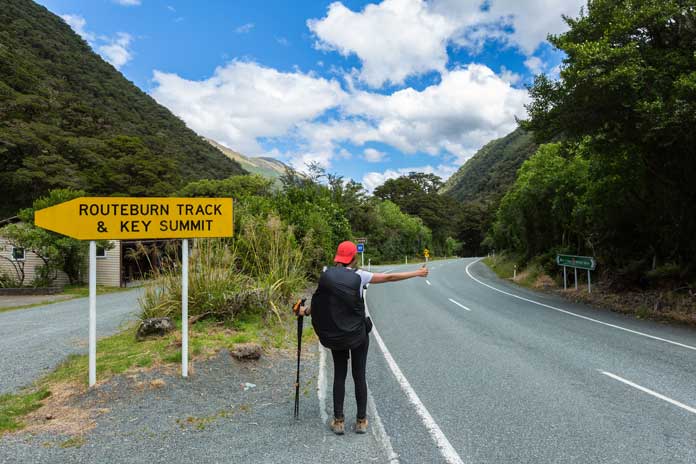
Rental Car
One other option would be to do relocation service for rental companies. That means that you picked up a rental car from one place and got a few days and some money for petrol to get it to the brand of the company in another city. You have to keep to the schedule, and your destination is decided for you too, but you get to use a car or van for free and even get some of the petrol covered. If that sounds like a good deal to you just check out this website: http://www.rentalcarrelocation.co.nz/
Accommodations in New Zealand for Backpackers
The most well-known option for a warm bed if you are on a low budget is the hostel, which is called backpackers in New Zealand. That can be confusing in the beginning, especially if you are used to look out for hostels, but you get used to it. Besides the change of name there is no difference to the hostels known all over the world. You got the choice between a dorm room, double room and single room. A normal kiwi backpackers provides you with a kitchen, bathroom and showers, a lounge or TV room and a laundry machine as well as a dryer for a small fee. There are a lot of backpackers in every corner of New Zealand which are in incredible conditions.
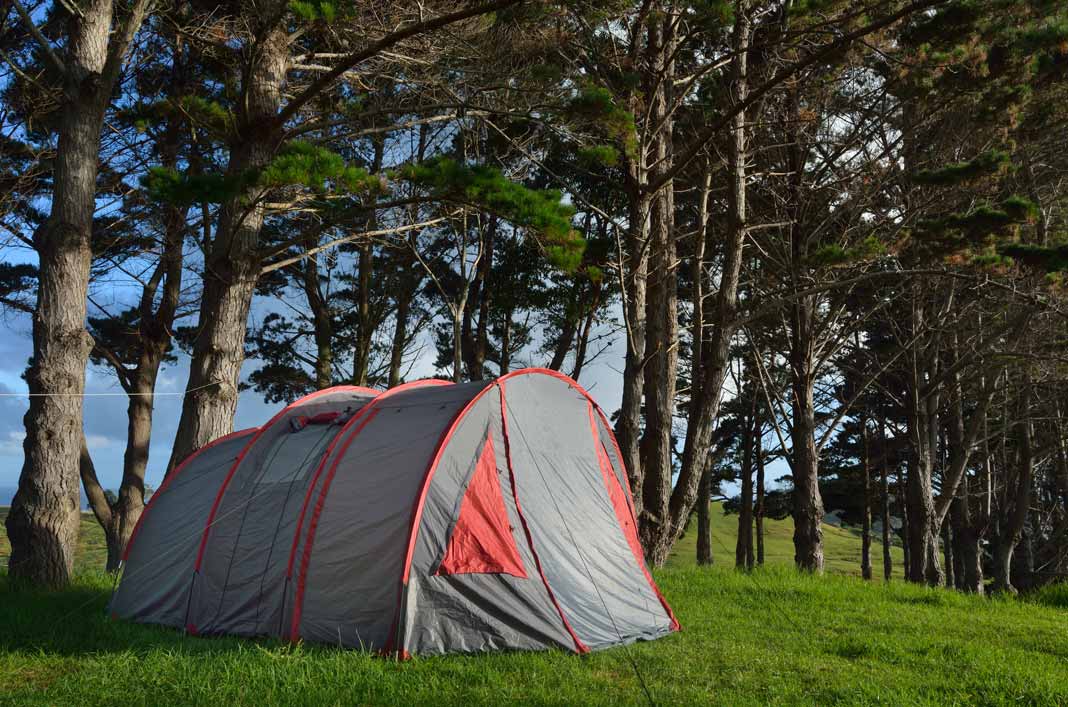
Whoever stayed in more than just a few hostels in his life knows how adventurous it can be to go to the toilet without fainting because of the sheer smell or to find a place in the kitchen where you can prepare your food without being afraid of catching some disease. This scenario will happen to you pretty rarely in New Zealand. Most of the facilities get cleaned at least once a day and the equipment is in good condition. Because of this comfortable ambiance people feel at home and are very sociable. Usually you get a discount if you stay at least a week. The price for a bed in a dorm room ranges from 25 NZ$ to 30 NZ$. As a member of BBH or YHA you get a discount in all participating backpackers.
Campsite
For every backpackers in New Zealand you will find a campsite too. This is the cheaper version of accommodation. You sleep in a tent or in your car/van on the premises of the campground and get to use the facilities. The basic facilities for a campsite are a kitchen and a bathroom and showers. Most of the campsites actually provide you with a lounge and laundry machine as well, but some lack these facilities. In some remote places the campsites also miss a kitchen, so make sure to check with the campsite first and take all the gear needed. Especially during the New Zealand summer the campsite is a good alternative to the backpackers as the warm weather allows you to feel comfortable in your tent. Some people even prefer to have a tent for themselves rather than sharing a room with 5 other people.
The main downside for most people is that you don’t have electricity at your disposal. Most campsites provide you with the possibility to charge your equipment in a common room or at a power station. The price for a campsite spot ranges between 17 NZ$ and 15 NZ$, even though it is sometimes possible to get a campsite spot for a charge as low as 12 NZ$.
Wwoofing
How would you like to have a room for yourself or for you and your travel mate? What would you say to get food provided? Would you like to have the time to explore the area around your home base and get in touch with locals? Are a few hours of working worth these amenities? This is the basic idea of wwoofing. You stay with locals, usually small families. They provide you with accommodation and food. In exchange, you agree to work for them for 3-4 hours. The work divers from host to host. A lot of the wwoofing hosts have an organic farm or some animals that need to be looked after. Others require general maintenance work on their property.
The biggest upside of wwoofing is not the free accommodation and food; it is being part of a New Zealand household for a while. You should use the opportunity to get some inside knowledge what it means to be a Kiwi and how the life of a local looks like. Especially for travelers from big cities this is a unique chance to experience the life of a farmer or a dairy worker. You can find wwoofing hosts in every part of New Zealand. You simply have to register on the website and setup your profile. The more information you give about yourself, your motivation and your skill set on your profile, the more likely it is to get approved by your preferred host. Be aware of the fact that during the main season most of the hosts are booked out weeks in advance.
Shared flat
Many a backpacker has to stay in one place for more than just one week, especially when the bank account is aching under the constant expanses of a traveler and it is time to work for a while. The majority of the backpacker decides to stay in backpackers for the time they are working, just because it is much nicer to get home to a warm house and a bed after work rather than a tent during a rainy evening. There is one alternative that provides you with most of the upsides of a backpacker but offers more privacy, a shared flat.
In the bigger cities in New Zealand you can find many landlords who rent out their rooms especially to backpackers. You get your room for yourself, still have other people around you to spend your time with and normally pay less than in backpackers. The flats and their equipment can varies from basic and rather rudimentary to fancy and luxurious. That also will affect the price, but you should have no trouble to find a well-equipped flat for 100 NZ$/week.
Campervan
Back home you would never think about living in a car. Living in a car basically means being king among the hobos, you have hit rock bottom if you have swapped your flat for a van. As a backpacker though, having a van you can sleep in is like having a penthouse with swimming pool. You have to put the money down for a van and for the interior as well as the equipment, but in return you get the freedom to bring your home with you wherever you go.
With a camping stove, storage room for all your cloth and gear and a mattress you got everything that you need to feel comfortable. Especially if you parked your van in front of a stunning landscape which you can admire in the morning with your fresh made coffee. The advantage of a camper van is that you can stay on every campground as well if you ever need something that your van does not have. Even some backpackers give you the opportunity to sleep in your van but use all the facilities for a sometime rather big discount on the weekly charge.
AirBnB
In the cities of New Zealand you can try to find a neat place to spend your weekend on AirBnB. You are able to find fancy flats for a small budget and treat yourself with a weekend as a part of the upper class.
Couchsurfing
Couchsurfing is an online community that lives by the idea of sharing and meeting people from other cultures. This is how it works: People provide their couch or spare bed for travelers and expect no payment in return. You get the advantage of staying with a local who has some priceless knowledge of secret hot spots to check out, best bars in town and so on. In return simply share the most valuable stuff you got on you, your stories, experiences and philosophy. Couchsurfing is all about helping each other out and getting to know interesting people.



